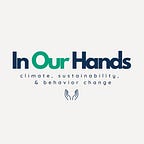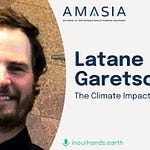In this episode, Ramanan speaks with Katy Milkman, the James G. Dinan Professor at The Wharton School of the University of Pennsylvania. Milkman’s research explores ways that insights from economics and psychology can be harnessed to change consequential behaviors for good, such as savings, exercise, vaccination take-up and discrimination.
She is also the author of the bestselling book How to Change: The Science of Getting From Where You Are to Where You Want to Be, which was named one of the eight best books for healthy living in 2021 by the New York Times. In 2018, she began hosting Charles Schwab’s popular podcast Choiceology with Katy Milkman, which explores key lessons from behavioral economics about decision-making.
They discuss planet-friendly behaviors, how the pandemic changed our behaviors, and how startups can spur behavior change. Full transcript is available above. This episode is also available on Apple Podcasts and Spotify.
In Our Hands is a production of Amasia. Follow these links for more about our firm, the Amasia blog, our climate fiction podcast, and Ramanan’s blog.
Highlights
[00:04:58] Designing for Behavior Change
[00:08:00] Behavior Change for Climate
[00:16:45] Policy and Behavior Change
[00:18:48] Behavior Change For Good Initiative












